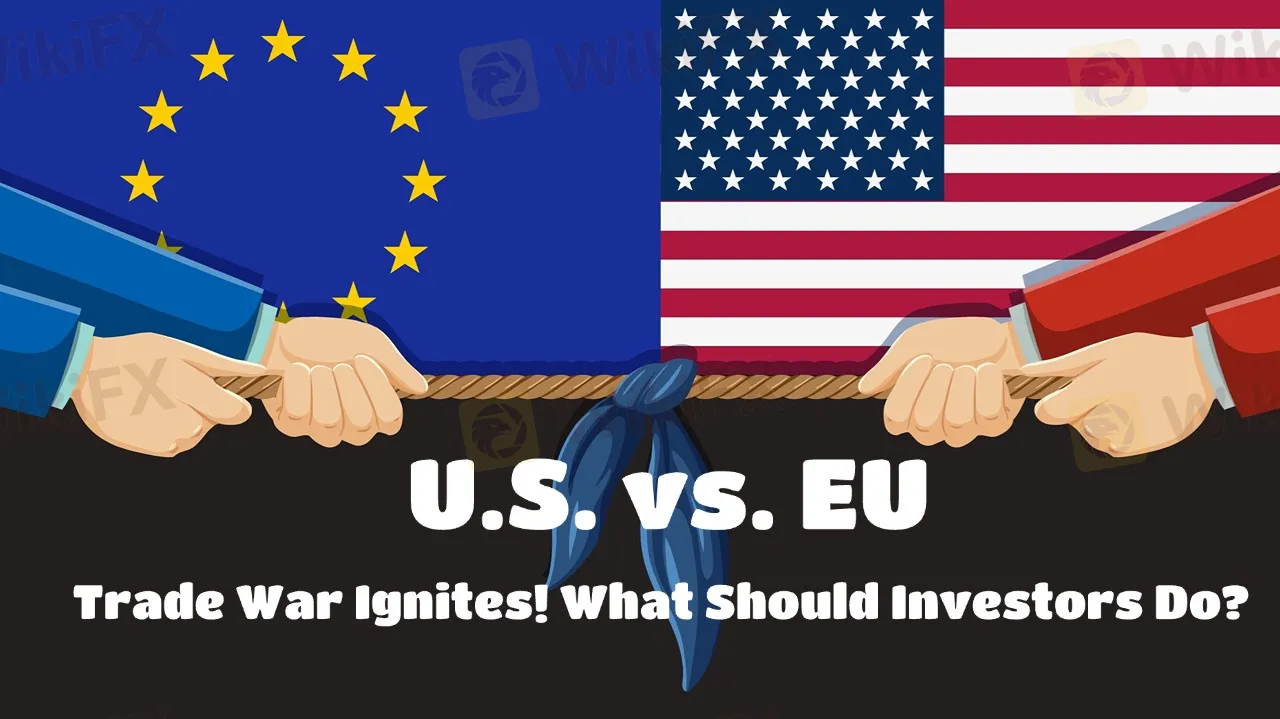简体中文
繁體中文
English
Pусский
日本語
ภาษาไทย
Tiếng Việt
Bahasa Indonesia
Español
हिन्दी
Filippiiniläinen
Français
Deutsch
Português
Türkçe
한국어
العربية
U.S.-EU Trade War Escalates: What Should Investors Do?
Abstract:The U.S.-EU trade war has officially begun, with escalating tariffs shaking the markets. Investors face significant challenges—how can they find opportunities amid the turmoil?

As the U.S. imposes a 25% tariff on imported steel and aluminum, the EU quickly retaliates with plans to impose tariffs on $283 billion worth of U.S. goods, set to take full effect in April. This tariff battle has already impacted market sentiment, with the euro slightly rising to $1.09 against the dollar.
Investors should brace for market volatility and closely monitor affected industries to adjust their strategies accordingly.
The trade war not only affects transatlantic trade but also disrupts global supply chains. The European steel and aluminum sectors face dual challenges: declining exports and increased competition from redirected U.S. products flooding the European market. Additionally, rising production costs in the U.S. could lead to higher consumer prices, further dampening market confidence.
Future Challenges and Investor Strategies
Given the current situation, investors should closely watch U.S.-EU negotiations and remain cautious about risks arising from market uncertainties. In the short term, industries affected by tariffs may experience price fluctuations, while sectors like energy and technology could benefit from trade shifts. To navigate the global market turmoil, investors must stay flexible in asset allocation to mitigate potential losses and seize emerging opportunities.

Disclaimer:
The views in this article only represent the author's personal views, and do not constitute investment advice on this platform. This platform does not guarantee the accuracy, completeness and timeliness of the information in the article, and will not be liable for any loss caused by the use of or reliance on the information in the article.
Read more

Fed Holds Rates Steady! Yen Faces Growing Uncertainty
The Fed stays put but strikes a hawkish tone. The yen remains under pressure as market uncertainty deepens.

Is Your Money Safe with Libra Markets? Check Out Fast!
n this exposure episode, we will take you through the heinous game played by Libra Markets, an unregulated forex broker. Take a look at how people are facing issues regarding withdrawals.

TradeHall vs. HYCM: Which Broker Should You Choose?
When choosing a broker, understanding the difference between superficial features and real regulatory protection is essential. In this article, WikiFX will compare TradeHall and HYCM. While on the surface, both brokers offer a wide range of trading instruments, the real difference lies in their regulatory statuses, which is a commonly overlooked factor for traders when they opt for brokers.

Trade Nation vs. FBS: Which Broker Is Better for New Traders?
If you're new to trading, choosing the right broker can feel overwhelming. Two popular choices, Trade Nation and FBS, offer very different experiences. This comparison breaks down which is better suited for beginners, based on ease of use, safety, costs, and support.
WikiFX Broker
Latest News
Tether Freezes $12.3 Million in USDT Over Money Laundering Concerns
MiCA Unlocks EU Crypto Market, but National Tensions Rise as Gemini and Coinbase Near Approval
Retirement Dreams Shattered: Don't Do This To Yourself!
Philippines Sets Southeast Asia’s First Crypto Regulatory Framework
EU Regulators Imposed Over €71M in Sanctions in 2024, ESMA Calls for Enforcement Convergence
FortuixAgent Review 2025: Is it Scam or Legit?
Danske Bank expects the European Central Bank to make its final interest rate cut in September.
No Regulation, Revoked Licence: Is Tradehall Safe to Use?
FXGT.com Trading Platform Review 2025
ATTENTION! Red Alert on These Brokers !
Currency Calculator


